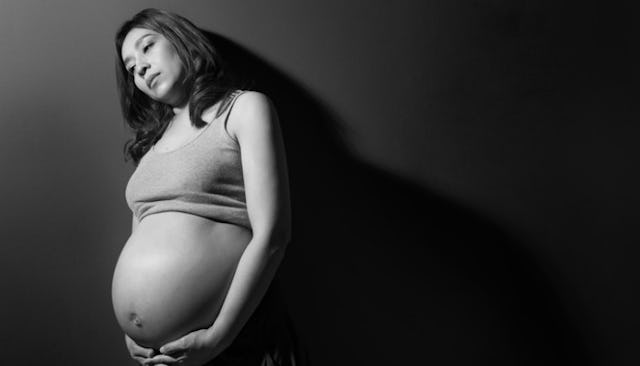Prenatal Depression Is A Thing Too, So We Need To Talk About It

During my 18th week of pregnancy, I went to my obstetrician for what I thought was a routine visit, and I left with the news that I’d be lucky to make it to 24 weeks. I had an incompetent cervix and was put on strict bedrest.
As each day passed and my belly grew bigger, I knew I should feel fortunate that my baby was still cooking. I had even gotten over the worst part of morning sickness and was seeing hints of that elusive second-trimester glow. But instead of being happy and hopeful, I became increasingly despondent. You know the faceless Dementors in Harry Potter who suck out people’s souls? It was like that. All the time. Not until I stumbled upon research years later did I discover that this real-life soul-sucking beast had a name: prenatal depression. Here’s what I wish I had known:
Prenatal depression is a thing.
Sounds crazy, but I had no idea prenatal depression was an actual diagnosis. It’s not even that uncommon: 1 in 10 women suffers from depression during pregnancy. But we don’t hear about it, and we certainly don’t talk about it, because no one wants to spoil the myth that pregnancy is an amazing, glorious time. Finding out my baby was in danger and being put on bedrest changed my life. It made sense that I was emotional, but I never expected to experience so much hopelessness. If I had known that prenatal depression was a thing, I would have asked my doctor for advice, antidepressants, maybe even Dementor repellent.
There will be guilt.
I didn’t think I had a right to be sad. There were women in my life who had trouble conceiving; how could I not enjoy every minute of this pregnancy? But I didn’t. Everything made me feel guilty, from the practical (I had to quit my job to be on bedrest, so I couldn’t contribute financially) to the totally insane (what kind of mother would I be if I couldn’t even keep my baby from falling out of my body?). Even the dog made me feel guilty because I couldn’t get out of bed to walk her. I was grateful for my pregnancy while simultaneously sinking deeper into darkness because of it.
Some people will never get it.
Your husband’s Aunt Sally can’t understand why you’re so sad. But she sure is happy to call to remind you that her sciatica is way worse than yours. Even when people have the best intentions, there is always going to be that one person who can’t stop talking about inappropriate things, like all the ways you can die in childbirth. Some people are just morons. One relative constantly reminded me how lucky I was to lounge around all day. Maybe she was trying to make light of the situation, but her words left me feeling even more isolated and depressed. Many people don’t know how to express themselves in socially appropriate ways.
Friendships change.
People I always thought would be there for me vanished. A formerly close friend called me once the entire five months I was on bedrest. She suffered from her own depression, and it was clear she couldn’t handle mine. Others, whom I had never expected, became my biggest advocates. A new neighbor came by every weekend to check on me and offer to bring me food. I never took her up on it, but it meant everything that she reached out when I was in a dark place. Now I invite her to dinner whenever I can. So yes, some friendships will wither, but others will blossom.
Your marriage will be tested.
Everyone knows that a baby changes your marriage, but no one talks about how pregnancy can do the same, especially a difficult one. The bills began piling up, my husband had to take on an added load of household chores, and well, forget about sex. Overnight, we went from, “Which page are we on in the Kama Sutra,” to “Look at me sexy one more time, and I’ll hurl this book at you.” We were newlyweds who hadn’t yet built up a solid foundation to deal with the possible loss of a child. I was a ball of despair. He was at a loss, and we began to grow apart.
Prenatal turns into postpartum.
Despite all my anxiety and medical issues, my child made it to term. Any concern for my well-being disappeared with the news my baby had been born healthy. But I continued to suffer; only now I had a tiny, helpless baby to take care of too. Not only did I find it nearly impossible to get out of bed, I also constantly worried about my child’s safety. You’ve heard of helicopter moms? I was F-16 fighter pilot mom. I wouldn’t even take him out of his five-point harness in public except to change a diaper. I could barely keep the kid alive while he was inside my belly; I couldn’t imagine how he’d survive out in the real world. When he was old enough to speak, even he would say, “Mom, you love me way too much.”
Over time my depression eased, but it wasn’t until my child was in kindergarten that the last remnants began to fade. The hard truth is that it took years to feel better, and there wasn’t any one moment that flipped the switch. Time, therapy, and a solid support system all contributed to my healing. Nowadays, when I’m lying in bed, I occasionally notice the faintest wisps of darkness hovering over in the corner. That’s when I grab my kid for snuggles and recall the single most important thing: Beyond the sorrow, there is an abundance of joy to be had. As for that soul-sucking beast, he can go suck it.
If you think you may have prenatal depression, visit the American Pregnancy Association for more information.